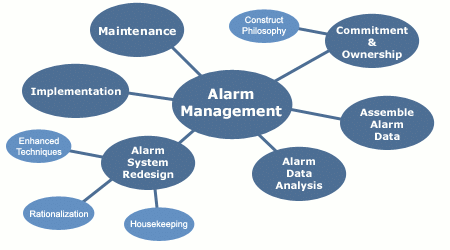Introduction
Currently process plants face significant challenges that significantly affect their productivity, efficiency, product quality, safety, integrity, and security. A well design alarm management system can address these challenges whereas a poorly designed alarm management system can cause serious consequences and also become a nuisance to plant operators and other personnel. Plant personnel dealing with the above issues need to attend this seminar lo learn and apply best practices of alarm management using real world examples and tools. Delegates will return to their jobs not only with a better understanding of alarm management best practices but equipped with a set of practical set of techniques, procedures and tools to optimize their alarm management system to increase the productivity, efficiency, product quality, safety, integrity, and security of their processes.
This seminar will highlight:
- A review of P & ID diagrams, process control, and process safeguarding
- Alarm management principles and alarm philosophy
- Alarm identification and rationalization
- Alarm design, implementation, operation and maintenance
- Alarm performance monitoring and assessment
- Use of hands-on tools for alarm rationalization, design, implementation, and operation.
Objectives
At the end of this seminar, you will learn to:
- Understand the fundamentals of alarm management and alarm philosophy
- Apply procedures for alarm rationalization
- Apply procedures for alarm design, implementation, operation and maintenance
- Apply procedures for alarm performance monitoring and assessment
- Implement alarm management procedures using hands-on tools
Training Methodology
This seminar has been designed for both novice and experienced engineers, operators, and technicians. The training methodology is a combination of Instructor presentations and case studies. This is followed by a series of videos involving the main course topics. This is complemented by Instructor led hands-on practicals using tools for alarm rationalization, design, implementation, operation and maintenance, performance monitoring and assessment. Throughout the seminar, delegates will learn through active participation using the tools followed by review exercises and questionnaires of each major topic.
Organizational Impact
When delegates return to their place of work, organizations will benefit from the following:
- Participants reviewed the most important concepts of alarm management principles and alarm philosophy
- Participants learned how to apply procedures for alarm rationalization, design, implementation, operation and maintenance, performance monitoring and assessment
- Participants got hands-on experience on implementing alarm management procedures using various tools
Personal Impact
When delegates return to their place of work, they will benefit from the following:
- Participate in specialized training in alarm management complementing their knowledge on instrumentation and process control and safeguarding
- Get in depth knowledge of using alarm management as a layer of protection
- Become familiar with a variety of alarm management procedures
- Participate in hands-on practicals, drills and workshops
- Network with fellow delegates
Who Should Attend?
This seminar should be of interest to a wide range of professionals interested in learning and applying alarm management for improving the productivity, efficiency, product quality, safety, integrity, and security of their processes.
This course is suitable to a wide range of professionals but will greatly benefit:
- Automation, Chemical, and Process Engineers
- Installation and maintenance technicians
- Instrumentation and Control Engineers
- Process Operators
- Production and Project Managers
- Other professionals who want a better understanding of the subject matter
SEMINAR OUTLINE
DAY 1
Introduction to Alarm Management and a Review of P&ID and Process Control Safeguarding
- What is Alarm Management?
- Main standards for Alarm Management: ISA 18.2, EEMUA 191, IEC 62682
- Review of P & ID diagrams
- Review of process control systems, BPCS
- Review of Process Control Safeguarding
- Hazard analysis
- Safety Instrumented systems (SIS)
- Layers of Protection Analysis (LOPA)
- Safeguarding examples
- Alarm Management as a layer of LOPA
- Benefits of Alarm Management
DAY 2
Alarm Issues, Alarm Principles and Philosophy
- What is an alarm?
- Alarm Issues
- Alarm proliferation
- Nuisance alarms
- Operator overload
- Alarm Management Principles
- Alarm Management Philosophy
- Alarm Philosophy Document
- Alarm Management lifecycle
- Alarm Identification
DAY 3
Alarm Rationalization
- Alarm objective analysis
- Documenting operator response time
- Assigning alarm priorities
- Classifying alarms
- Defining alarm attributes
- Assessing the need of advanced alarming
- Procedures and configuration Examples
DAY 4
Alarm Design, Implementation, Operation and Maintenance
- Basic alarm design
- Application of alarm deadband (hysteresis)
- Application of on/off delays
- Alarms and interlocks
- SIS / ESD alarms
- HMIs for alarms
- Advanced alarm design: dynamic alarm suppression
- Alarm system testing
- Alarm maintenance
- Alarm shelving
- Alarm response procedures
DAY 5
Alarm Performance Monitoring and Assessment
- Alarm key performance indicators (KPIs)
- Alarm system performance reporting
- Alarm analysis:
- Annunciated alarm rate
- Alarm floods
- Out of service alarms
- Chattering, redundant, shelved alarms
- Alarm reporting
- Alarm audits
- Course Summary

